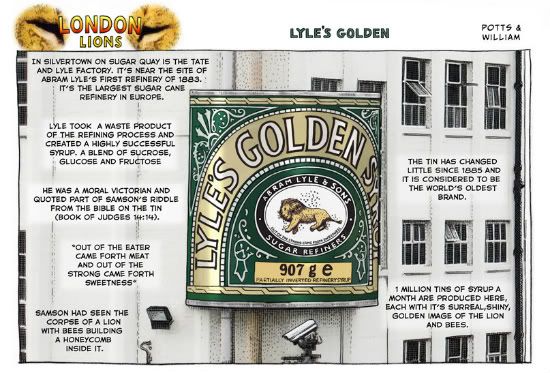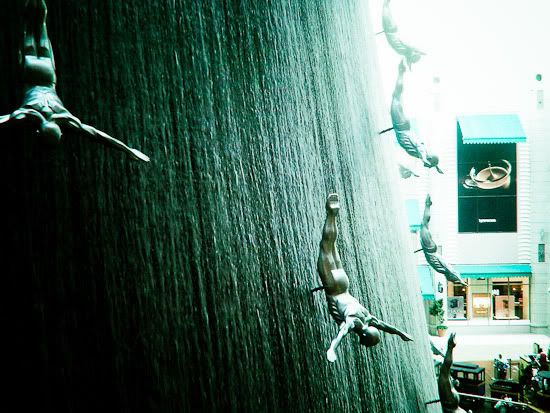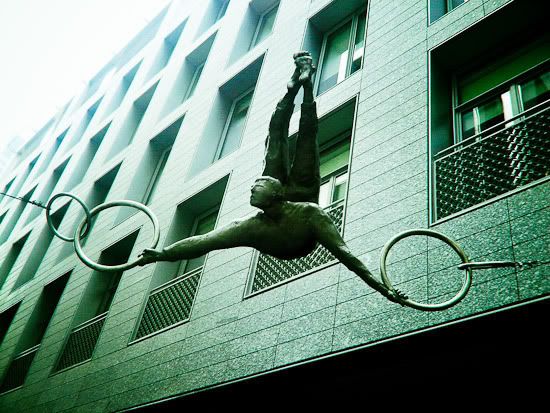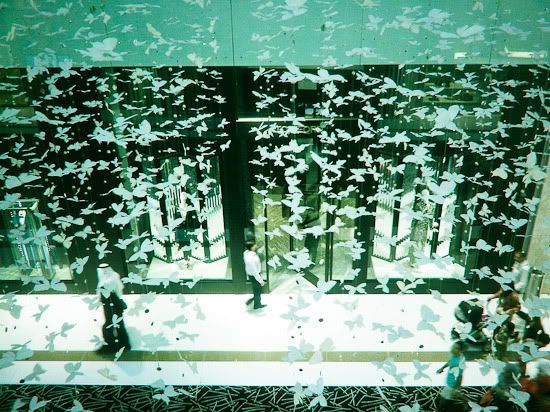
23 July 2011
10 July 2011
Out of the strong came forth sweetness

At Samson's wedding, he posed a riddle to his thirty Philistine groomsmen:
Out of the eater came forth meat,
Out of the strong came forth sweetness.
I hope he told them that they were supposed to guess a scene, for I could make neither head nor tail of the riddle at first.
The answer is the scene depicted on the tin of Lyle's Golden Syrup. Fascinating. (The rest of the story between Samson and the Philistines is however rather violent and testosterone-filled I am afraid.)
Note: I have seen and prefer a more rhyming phrasing: "Out of the eater came forth meat, out of the strong something sweet". However, the above is what appears in Abram Lyle's bible and the King James' bible.
09 July 2011
06 July 2011
Until human judgment is infallible
It has been »widely reported that the current President Nathan stated last year that he can only grant pardon from the death penalty "on" the advice of the Cabinet. That is, a President has no discretion - the Cabinet decides, the President signs.
The operative paragraph is para 22P of the Singapore Constitution which states:
Grant of pardon, etc.
22P. —(1) The President, as occasion shall arise, may, on the advice of the Cabinet —
(a) grant a pardon to any accomplice in any offence who gives information which leads to the conviction of the principal offender or any one of the principal offenders, if more than one;
(b) grant to any offender convicted of any offence in any court in Singapore, a pardon, free or subject to lawful conditions, or any reprieve or respite, either indefinite or for such period as the President may think fit, of the execution of any sentence pronounced on such offender; or
(c) remit the whole or any part of such sentence or of any penalty or forfeiture imposed by law.
(2) Where any offender has been condemned to death by the sentence of any court and in the event of an appeal such sentence has been confirmed by the appellate court, the President shall cause the reports which are made to him by the Judge who tried the case and the Chief Justice or other presiding Judge of the appellate court to be forwarded to the Attorney-General with instructions that, after the Attorney-General has given his opinion thereon, the reports shall be sent, together with the Attorney-General’s opinion, to the Cabinet so that the Cabinet may advise the President on the exercise of the power conferred on him by clause (1).
Per »Siew Kum Hong's analysis, I agree that this has to be read in conjunction with para 21 of the Constitution, a few paragraphs up from para 22P:
21. —(1) Except as provided by this Constitution, the President shall, in the exercise of his functions under this Constitution or any other written law, act in accordance with the advice of the Cabinet or of a Minister acting under the general authority of the Cabinet.
(2) The President may act in his discretion in the performance of the following functions:...However, Siew implicitly argues that para 21 contains an exhaustive listing of all the decisions that the President has discretion to decide. Since the death sentence pardon in para 22P falls outside of para 21, there is no discretion allowed.
I disagree on this last point, for para 21(1) states "except as provided by this Constitution" not "except as provided by this paragraph". It is not beyond the shadow of doubt for me that para 21 necessarily precludes discretion of the President in para 22P.
My question is why para 22P uses "on the advice of the Cabinet". Why has para 22P not used "in accordance with the advice of the Cabinet", which would have left no room for doubt? In my mind, one interpretation of "on the advice" could be that the President has to necessarily seek counsel from the Cabinet before granting a pardon and give weight to its advice. But he or she may not necessarily end up acting in accordance to it.
There are only two possibilities as to why para 22P does not use "in accordance with": (a) the draughtsman did not give too much thought; (b) it was deliberate. Either is possible, but in all likelihood, (a) is the more probable case. (If you have seen how lawyers work and the kind of time pressure they are under, it will not come as a surprise.)
If the draughtsman didn't give too much thought, the onus then falls upon the judiciary to interpret it in a reasonable way. Sim Kum Hong and the Court did not think that there was room for any other interpretation. »M Ravi thought there was and proposed the very attractive doctrine of legitimate expectations. It was however defeated in court.
It is not an outcome I like. I can accept it if President Nathan did not want to grant the case at hand (Yong Vui Kong, for drug trafficking) a pardon. In fact, I have often explained to people that we cannot run a country if we keep granting ex post exceptions. It is however very dissatisfying to see President Nathan deflect his personal burden of saying no by instead creating a constitutional interpretation that Presidents have no discretion to grant clemency. It further begs the question of whether past pardons are constitutional, if it turns out that past Presidents somehow did not act in accordance with the Cabinet "advice". If I were one of the seven lucky people in Singapore's history who managed to receive a pardon from past Presidents, I would be very worried.
But the law is the law, and the letter of the law has failed the popular expectation of what it is supposed to do. The only thing we can do now is to change it.
My attention turned onto the issue of pardon recently because of the compounded effect of the mandatory death sentence. I have seen those three words many times in the last 20 years, but did not fully grasp its full meaning until a week ago. Mandatory death sentence does not mean "a maximum penalty of death sentence". In the specific case of drug trafficking, it means simply this: if you are in possession of more than x grams of drug y, the public prosecutor is obliged to push for the death sentence and the judge is obliged to sentence the same. There is no gray area, no extenuating circumstances, no judicial discretion in prescribing something other than death sentence.
This is my understanding of how »Schedule 2 of the Misuse of Drugs Act works. I would love to be told that I am wrong, but it is unlikely.
All these come together to mean the following: if you are caught with more than x grams of drugs, and you are unable to rebut the presumption that you have knowledge of it, the presidential pardon is essentially the only hope. However, we are now faced with the situation that the decision for this pardon lies not with the President, but with the Cabinet who is most unlikely to diverge from the stance of the public prosecutor.
We cannot allow both to exist in our system for the simple reason that the British MP Sydney Silverman has put so elegantly in 1948 -
Until human judgment is infallible, we have no right to inflict irrevocable doom.
05 July 2011
Powers of the Singapore President
With the Singapore Presidential Elections around the corner, I decided to see if the Singapore President is really as powerless as is often believed.
I was pleasantly surprised by what the Constitution contains. If the President wants to make a credible job of earning his keep, he in fact has the constitutional power to do a number of things. It is already well known that he is supposed to safeguard the reserves. What I was not aware is that he also has veto power over the appointments and budgets of statutory boards and Government companies. Even more importantly, he can veto detention or further detentions under »Part XII of the Constitution. This would include detention without trial, a colonial remnant still retained in Singapore and Malaysia laws.
So, there are perfectly good reasons to choose your candidate carefully. Did you also know that the President enjoys immunity from suit for actions arising from his official capacity? This immunity can only trumped by a tribunal convened by the Parliament against him.
For those who enjoy legalese, below is the overview paragraph of the President's functions. The right to grant pardon from the death penalty is not there, because it is in paragraph 22P. I will discuss 22P in a separate post because its language and recent events left me confused as to the exact powers of the President.
I was pleasantly surprised by what the Constitution contains. If the President wants to make a credible job of earning his keep, he in fact has the constitutional power to do a number of things. It is already well known that he is supposed to safeguard the reserves. What I was not aware is that he also has veto power over the appointments and budgets of statutory boards and Government companies. Even more importantly, he can veto detention or further detentions under »Part XII of the Constitution. This would include detention without trial, a colonial remnant still retained in Singapore and Malaysia laws.
So, there are perfectly good reasons to choose your candidate carefully. Did you also know that the President enjoys immunity from suit for actions arising from his official capacity? This immunity can only trumped by a tribunal convened by the Parliament against him.
For those who enjoy legalese, below is the overview paragraph of the President's functions. The right to grant pardon from the death penalty is not there, because it is in paragraph 22P. I will discuss 22P in a separate post because its language and recent events left me confused as to the exact powers of the President.
»CONSTITUTION OF THE REPUBLIC OF SINGAPORE
Discharge and performance of functions of President
21. —(1) Except as provided by this Constitution, the President shall, in the exercise of his functions under this Constitution or any other written law, act in accordance with the advice of the Cabinet or of a Minister acting under the general authority of the Cabinet.
(2) The President may act in his discretion in the performance of the following functions:
(a) the appointment of the Prime Minister in accordance with Article 25;
(b) the withholding of consent to a request for a dissolution of Parliament;
(c) the withholding of assent to any Bill under Article *5A, 22E, 22H, 144 (2) or 148A;
*Article 5A was not in operation at the date of this Reprint.
(d) the withholding of concurrence under Article 144 to any guarantee or loan to be given or raised by the Government;
(e) the withholding of concurrence and approval to the appointments and budgets of the statutory boards and Government companies to which Articles 22A and 22C, respectively, apply;
(f) the disapproval of transactions referred to in Article 22B (7), 22D (6) or 148G;
(g) the withholding of concurrence under Article 151 (4) in relation to the detention or further detention of any person under any law or ordinance made or promulgated in pursuance of Part XII;
(h) the exercise of his functions under section 12 of the Maintenance of Religious Harmony Act (Cap. 167A); and
(i) any other function the performance of which the President is authorised by this Constitution to act in his discretion.
03 July 2011
"Where is the Love..."

 Sunset with 63,000 people and the Black Eyed Peas in Hyde Park. Rocked out!
Sunset with 63,000 people and the Black Eyed Peas in Hyde Park. Rocked out!Camera-phone series #32.
Ronsard
A Cassandre
Mignonne, allons voir si la rose
Qui ce matin avoit déclose
Sa robe de pourpre au Soleil,
A point perdu cette vesprée
Les plis de sa robe pourprée,
Et son teint au vôtre pareil.
Las ! voyez comme en peu d'espace,
Mignonne, elle a dessus la place
Las ! las ses beautés laissé choir !
Ô vraiment marâtre Nature,
Puis qu'une telle fleur ne dure
Que du matin jusques au soir !
Donc, si vous me croyez, mignonne,
Tandis que votre âge fleuronne
En sa plus verte nouveauté,
Cueillez, cueillez vôtre jeunesse :
Comme à cette fleur la vieillesse
Fera ternir votre beauté.
Ode To Cassandra
Mignonne, come let us see if the rose
Which this morning opened
Her robe of crimson to the sun,
Has not already lost, at evening,
The folds of her crimson robe,
And her complexion, so like your own.
Alas, see how in such short a time,
Mignonne, she has, from above,
Alas, Alas, let her beauty fall!
O Nature, truly cruel,
That such a flower should endure
Only from morning till evening.
Now, if you would believe me, mignonne,
While your young age is in flower
In its verdant freshness,
Pluck, pluck your youth,
Since, as with this flower, old age
Shall tarnish your beauty.
- Pierre de Ronsard, 1524-1585
Witness the sterility of translation:
Cueillez, cueillez vôtre jeunesse :
Comme à cette fleur la vieillesse
Fera ternir votre beauté.
Pluck, pluck your youth,
Since, as with this flower, old age
Shall tarnish your beauty.
Pluck?!
There are translators who attempt to inject some poetry, but it loses the meaning and musicality of cueillez, cueillez completely:
Be merry ere your beauty flit,
For length of days will tarnish it
Like roses that were loveliest.
I don't think liberties of this extent should be allowed, particularly since the last line really does not work .
This one is better but still no cueillez and the insertion of doom seems contrived:
Do take advantage of your youthful bloom:
As it did to this flower, the doom
Of age will blight your beauty.
If I had my way, I would make it mandatory for all translated poems to be published side-by-side with the original.
Subscribe to:
Posts (Atom)



